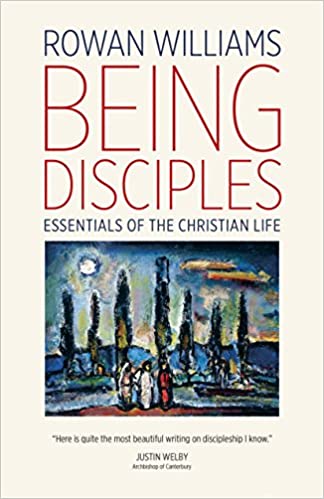Tonight we will be gathering to discuss chapter 3 – Forgiveness – of Archbishop Rowan Williams’ book: Being Disciples: Essentials of the Christian Life. Please read over this chapter slowly in preparation for this evening.
A blog that I read often is Glory to God for All Things. It is written by Fr. Stephen Freeman who grew up conservative Baptist in upstate South Carolina, converted to the Episcopal Church in college (eventually becoming a priest), and who moved on the Orthodox Church in America (affiliated with Russian Orthodoxy). His last three blog posts have all been on the topic of forgiveness and dovetail with Dr. Williams’ discussion.
In his February 25 blog post, Fr. Freeman addresses the question of Can You Forgive Someone Else’s Enemy? Fr. Freeman points out that in Jesus’ ministry, the forgiveness of sins is not about the remission of a legal debt for a wrong that had been done. Rather, forgiveness is about loosening and binding. (John 20:23, Matt. 16:19). We see this demonstrated physically in the story of the healing of the paralytic (Mark 2:3-11), when Jesus says “Your sins and forgiven, get up and walk.” A sin binds the victim, the wrongdoer, their families, and even the witnesses. Forgiveness is the loosening of the bonds that were forged by the sin, and is the only way that provides a way forward for everyone involved.
In his February 29 blog post, Fr. Freeman addresses the issue that Forgiveness is the Hardest Love of All. Like all aspects of discipleship, forgiveness is not a discrete act but a way of life. Like an athlete that trains his body to perform an action automatically, so a disciple trains his heart in the same way. In the post, he sets forth a six point training program to develop a life of forgiveness:
Start forgiving the small things – an errant child, bad traffic, and little inconsequential irritations;
Like Jesus on the cross, pray that God would not condemn your enemies for their sins against you;
Always be aware of your own failings and constant need of God’s forgiveness;
Cultivate an understanding that everyone is broken and a victim of the Fall;
Pray and ask God for forgiveness; and
Confess your resentments.
Finally, in his March 5 post, Fr. Freeman brings up the issue of the inner voice of condemnation in Look Who’s Talking. We all have that inner voice that tells us we are naked and ashamed. (Gen. 3). “It is like a wounded animal within us, criticizing, judging, negative, destructive, never rejoicing. It offers no wisdom. It builds nothing up.” This voice magnifies our sins and tells us that we are outside of God’s forgiveness and God’s grace. This voice of destruction comes from the dark side of the self and its ego and its pride. It is our fallen pride that will not allow us to accept forgiveness and wishes to persist in self-centered guilt.
But love your enemies, and do good, and lend, expecting nothing in return; and your reward will be great, and you will be sons of the Most High; for he is kind to the ungrateful and the selfish. Be merciful, even as your Father is merciful. Judge not, and you will not be judged; condemn not, and you will not be condemned; forgive, and you will be forgiven; give, and it will be given to you; good measure, pressed down, shaken together, running over, will be put into your lap. For the measure you give will be the measure you get back. Luke 6:35-38.

